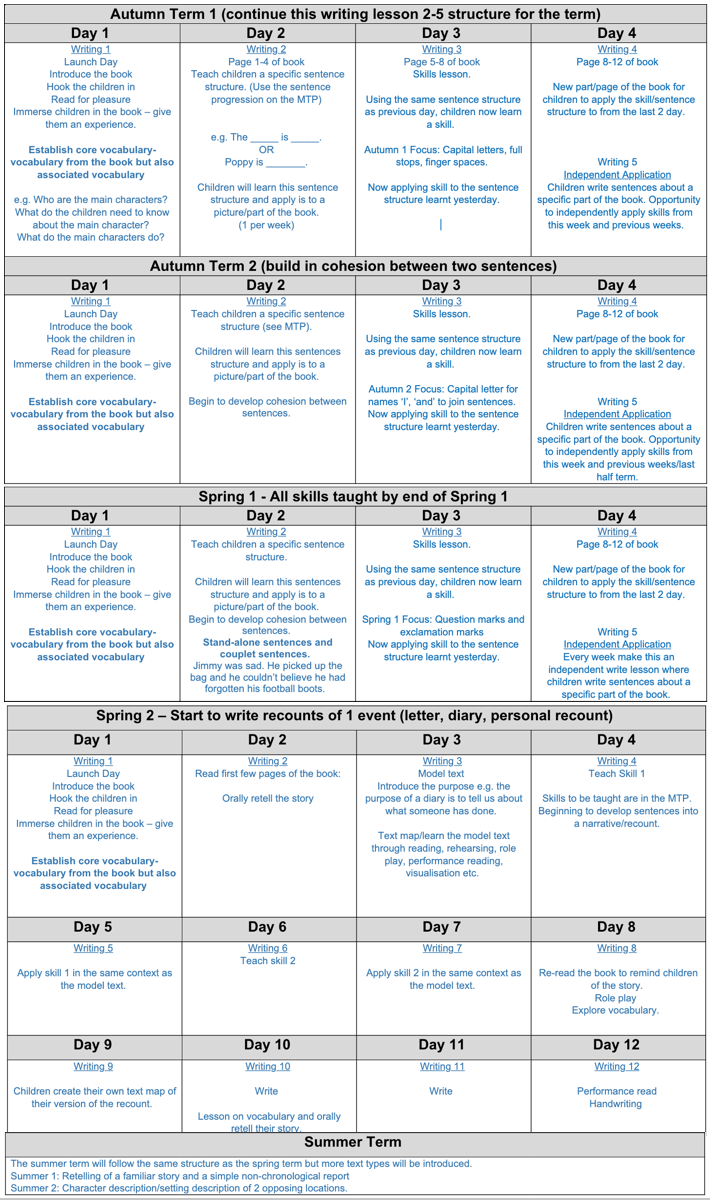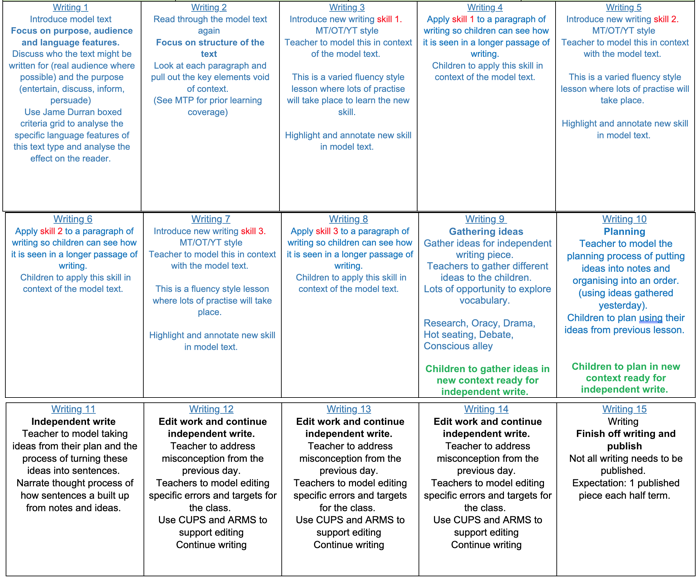English
Reading and Writing
English Intent
At Whitmore Park, we believe reading, writing and communication create the foundation for children’s learning. The English curriculum is centred around high-quality literature to enable pupils to broaden their vocabulary as well as open their minds to new cultures and experiences, helping to foster a love for language and literature and give the children the tools to be life-long learners. In our curriculum, reading is a priority and we endeavour to support children to become fluent and confident readers. We provide pupils with quality examples of writing in order to inspire their own work so they can develop their own style and voice as they draw upon what they have read. We want to provide a rich and engaging English curriculum that not only equips pupils with essential literacy skills, but also inspires creativity and passion. Our ultimate aim is to ensure that all pupils, regardless of background or ability, develop a strong command of the English language, enabling them to communicate effectively with both spoken and written language; think critically about authors’ writing and their own and access a wide range of texts with confidence and understanding.
Reading Implementation
After completing the Read Write Inc scheme of work, pupils are then taught further fluency and comprehension skills. We follow a bespoke weekly reading structure using carefully selected books, chosen for their interesting structures, high level of vocabulary and engaging themes. In every lesson, children read an extract of text and have the opportunity to develop their word reading and fluency skills. Throughout the week, the teacher models fluent reading and the children echo this and then practice applying these skills with a partner.
Every reading lesson begins with a pre-teach of new vocabulary from the text. The children are taught up to 3 words that they need to know in order to understand the text and they have the opportunity to orally apply this vocabulary in context. Each week begins with ‘book talk’ lesson with an extract from the class text. In this lesson, the aim is to create a mental model of the text and for the children to develop a strong understanding of what they are reading through questioning and discussion. The children are then taught key skills they need for reading and have the opportunity to apply these skills to different styles of comprehension questions before completing a stand-alone comprehension task at the end of the week to apply their skills in a new context.
The children have reading for pleasure sessions three times per week. This is an opportunity to read quietly with a book that they enjoy, read their levelled reading book or talk about and recommend books that they have been enjoying recently. The teacher’s role is to listen to children read or to facilitate discussions around books to promote a love of reading.

Writing Implementation
In Year 1, the children being to learn key sentence structures each week based around a high-quality text. They will also begin to develop the basic skills of sentence writing before, over the course of the year, building on this and developing the cohesion between sentences. They will then move on to writing sentences that are sequenced to form a narrative or recount based on the chosen class texts or a real experience. This creates a secure foundation for the children as they move on to Year 2 where they begin to learn about writing for different purposes.

From Year 2 onwards, writing lessons are based on the high-quality texts that the children have been studying in reading. Children are introduced to model texts that exemplify different purposes for writing: to entertain, to inform, to explain, to persuade and to discuss. After analysing the language and structure of the model text, the children are taught up to three key skills that will support their writing. They then go on to generate ideas in a new context ready for independent writing. At this stage, children are exposed to rich vocabulary and are encouraged to talk about and orally rehearse their ideas. They then go on to organise these ideas into a plan before drafts, editing and sometimes publishing their final draft.

Handwriting
It is an expectation at Whitmore Park that teachers model the correct handwriting for the stage that the children are at in their writing development.
In Early Years, children being to develop the fine and gross motor skills needed to begin writing. They improve their pencil grip, physical skills and begin learning basic letter formation needed so that they are ready to write in Key Stage 1.
In Year 1, the children use the Read Write inc. handwriting phrases to help them learn the basic letter formation in both lower and upper case.
In Year 2, children are introduced to the beginning stages of cursive writing. They learn the phrase: “Start on the line, sweep up, pause, form the letter and exit.” Each letter of the alphabet is grouped into families for that similar letters are practised together.
In Key Stage 2, the children continue to develop their cursive handwriting by practising individual letters within the same family and using the ‘sweep up’ from each letter to begin to join their handwriting.
Spelling
Spelling is taught using the spelling shed scheme.
English Impact
In reading, daily formative assessment is used to address gaps and misconceptions. Termly NTS Reading and GAPS assessments are carried out and the results are put onto Mark for question by question analysis in order to formally analyse the gaps in learning so that these can then be addressed in lessons. These assessments also provide a reading age which we use to monitor the pupils’ reading level. Each half term, teachers use the Collins Reading Fluency assessment to monitor pupils’ reading levels. During timetabled reading for pleasure sessions, teachers and TAs read with children on a 1:1 basis. In Key Stage 1, every child reads with an adult every week and in Key Stage 2 every child is heard on a bi-weekly basis however, the lowest 20% of children are targeted weekly.
All extended pieces of writing are marked against the success criteria for that unit of work and prior learning to ensure that this is embedded. Daily formative assessment takes place to address misconceptions, especially during the lessons where the children are applying a skill they have just learnt and in lessons where they are editing. Writing is moderated in school termly, using our own point in time assessments. We have broken down the curriculum for each year group to show what the children need to achieve in Autumn, Spring and Summer to be on track to reach the expected standard or above throughout the year. After the moderation process, all teachers meet with the English team to discuss their judgments and show examples of the evidence that they have found to support this.
The senior leadership team and the English team speak to the children as part of our regular monitoring. This is to explore what they have learnt and what they remember. This gives the children an opportunity to give their feedback about what they have enjoyed and allows the leaders to identify key improvement actions.
Early Reading
At Whitmore Park Primary School, we believe that reading is the most essential skill our pupils will develop during their time at our school. Because of the value we place on this, reading underpins the broad curriculum we offer at Whitmore Park. We have created an atmosphere that promotes a love of reading through exposing pupils to a variety of rich texts and experiences.
The National Curriculum divides Reading into two core elements:
- Word reading
- Comprehension (both listening and reading)
At Whitmore Park Primary School, teachers value these elements and centre their lessons around these fundamental skills.
It is our aim, for our pupils to be confident speakers, responsive listeners, passionate readers and creative writers, in order to be able to succeed in a global society. Therefore, in addition to the core fundamental elements of reading outlined above, we promote:
- A love of reading including for pleasure
- A pupil’s right to be exposed to a wide variety of vocabulary, texts and experiences
- A shared love of language, reading and books
- Rich and significant links across the wider curriculum
Early Years and Key Stage 1
At our school, we use a structured, synthetic phonics approach to teaching pupils to read. The scheme we use is called Read Write Inc.
Early Years and Key Stage 1 (KS1)
The teaching of sounds represented by letters starts in Nursery when pupils are identified as being ready for this learning. This means that in Nursery, individual pupils will start their phonic learning at different points during the year. Once pupils have learnt some single letter sounds, they will be taught to hear a sequence of sounds and then blend those sounds to say a word.
When pupils join the Reception classes they continue to learn the 44 sounds that form the English language. They learn to blend the sounds together as it is an essential skill using ‘Fred Talk’ ‘Read Write Inc.’ which is oral blending. Fred can only speak in ‘Fred Talk’. For example Fred says ‘S-I-T’ and the pupils blend the letters together to say ‘sit’. They are then encouraged to say the sounds quietly and eventually in their head (Fred in your head) with the aim that pupils will develop the ability to decode automatically. As soon as they are able to blend, pupils begin to read the specially written, lively story books in every ‘Read Write Inc.’ lesson and have the opportunity to read individually to the staff.
In Year 1, pupils continue to learn more sounds and blend more complex words. They also develop their comprehension skills through a variety of activities during the ‘Read Write Inc.’ sessions. Pupils have four phonics and four comprehension lessons of 30 minutes each week.
Some pupils complete the RWI phonics programme before the end of year 1. These pupils continue to consolidate their phonic knowledge and learn to apply their skills to decode more complex multi-syllabic words. These pupils read more challenging texts and develop their comprehension skills.
Some pupils continue the ‘Read Write Inc.’ phonics and reading programme through to the end of Year 1 and a small number of pupils may need to continue the phonics programme as they enter Year 2.
As pupils move through the scheme, the ‘Read Write Inc.’ leader carefully monitors their progress. Pupils are assessed every six weeks and are placed into groups according to their reading ability. Any pupils who do not make the expected progress are given a one to one intervention to ensure that they close the gap. Pupil Premium pupils and those with special educational needs read four times a week to a member of staff.
All of the pupils take reading books home, which are matched to their reading ability. We actively and positively encourage parents to share these books with their children at home and listen to them read. As pupils become more confident readers, we expect parents to continue reading to them. It is an expectation that parents listen to their child read a minimum of three times a week.
In Year 2 pupils continue to consolidate their phonic knowledge and comprehension skills. Our school uses the Literacy and Language programme. Year 2 pupils have four reading lessons each week. These reading lessons extend pupils’ comprehension ability and prepare them for the challenges of reading as they move into KS2.
Read Write Inc.
Read Write Inc (phonics) is for four to seven-year-old pupils learning to read and write, and for seven and eight-year-olds who need to catch up. It is a complete literacy programme taught for 20 – 40 minutes a day in Reception and an hour a day in Year 1 and above. It is proven to develop:
- fluent, enthusiastic readers
- deep comprehension of texts
- confident speakers
- keen writers
pupils are taught to:
- learn to read and write letter-sound correspondences quickly
- decode effortlessly, spell and handwrite easily
- comprehend what they read
- read with fluency and expression
- write confidently using oral rehearsal
- work effectively with a partner to articulate their learning at every step
Phonics Screening Parents Meeting
Phonics Screening Year 2 2020 (with sound)Phonics Screening Parents Meeting Year 2 2020
Read Write Inc resources published by Oxford University Press
Accelerated Reader by Renaissance Learning



